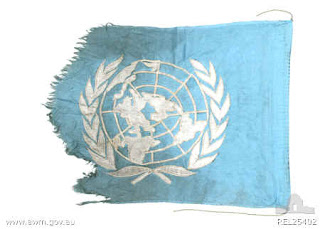Anyone who, against all reason, had managed to retain a strand of belief that the UN Security Council — and the UN in general — was a functional body that could speak in the name of humanity must have felt like hiding in a basement in the past weeks.
 Day after day, starting with UN Secretary-General Ban Ki-moon’s arrogating powers that aren’t his on Taiwan’s UN membership bid, followed by a succession of heads of state achieving nothing of substance during the 62nd General Assembly meeting other than vying to see who would manage to make this year’s most unorthodox, media-grabbing diatribe against the leader of another state (to think that last year’s “sulfur” comment is already passé) and, finally, by the Council’s failing, on Tuesday, to agree on a formal condemnation of the attack on African Union troops in Darfur simply because Council members could not reach consensus on whether the attack by rebels constituted a “terrorist” attack or not — day after day, indeed, the UN has proven without doubt that its utility is waning, and fast. Oh, and one should not omit mentioning UN special envoy Ibrahim Gambari’s visit to Myanmar, a meek, beggarly attempt (no offense, Mr. Gambari) that seems, at the most, to ask the junta to refrain from terrorizing its population too much while the envoy is in the country.
Day after day, starting with UN Secretary-General Ban Ki-moon’s arrogating powers that aren’t his on Taiwan’s UN membership bid, followed by a succession of heads of state achieving nothing of substance during the 62nd General Assembly meeting other than vying to see who would manage to make this year’s most unorthodox, media-grabbing diatribe against the leader of another state (to think that last year’s “sulfur” comment is already passé) and, finally, by the Council’s failing, on Tuesday, to agree on a formal condemnation of the attack on African Union troops in Darfur simply because Council members could not reach consensus on whether the attack by rebels constituted a “terrorist” attack or not — day after day, indeed, the UN has proven without doubt that its utility is waning, and fast. Oh, and one should not omit mentioning UN special envoy Ibrahim Gambari’s visit to Myanmar, a meek, beggarly attempt (no offense, Mr. Gambari) that seems, at the most, to ask the junta to refrain from terrorizing its population too much while the envoy is in the country.Underscoring all this, no sooner had the General Assembly closed its Babel-like exercise in futility than heads of state, from Iranian President Mahmoud Ahmadinejad to Venezuelan President Hugo Chavez, to name but two, were making bilateral declarations whose ramifications will far outpace whatever was achieved at the UN.
Not to be unfair (and to rehash an old saying), the UN is but the sum of its constituents — member states — and some of its branches, such as the IAEA, have managed to function. But irrespective of what it is, as a decision-making body it seems to have reached a point in its history where it cannot do anything, a situation that has a lot to do with the cynical coterie of world leaders, elected and not, we have today, many of whom seem to see the body as nothing more than a podium where one slams a shoe on a table, brandishes a marijuana plant, speaks of the devil, lies about the presence of weapons of mass destruction in another country, berates the body for picking on Israel and so on, ad nauseam, until their antics are pushed off the front page as news develop elsewhere in the world. So far removed has the body become from reality that it now draws comparisons with the so-called ivory towers of academia — an unfair allusion, perhaps, as universities and think tanks come nowhere near the level of cynicism one encounters at the UN, and the destitute do not place their hopes and trust in them.
One must wonder why, aside from the recognition it would grant it, a country like Taiwan has worked so hard to obtain membership at the UN, given that it probably can achieve far more working outside that institution than it would once inside its antediluvian walls.
It would be a great loss to humanity if the UN — as a concept — were to bring about its own demise through sclerotic turpitude, and every effort should be made to ensure that this does not happen. But in its current form, its disappearance would not be of great consequence.
It is with some trepidation that I write this, as I once harbored great admiration for an institution that, sixty years ago or so, was founded on principles that should have served us all and made the world body a true parliament of man[kind]. To this day and the above notwithstanding, I remain a strong believer in the superiority of multilateralism to ameliorate the lot of humanity.
How Canadian of me.

2 comments:
"..sclerotic turpitude.."
Nice!
I'm not so big on the idea of a single-world government. It would be a dangerous concentration of power.
That said, the UN is toothless. As long as some countries have veto powers, the UN is incapable of doing anything that offends any veto wielding state, and Taiwan's attempts to join will be futile.
Post a Comment